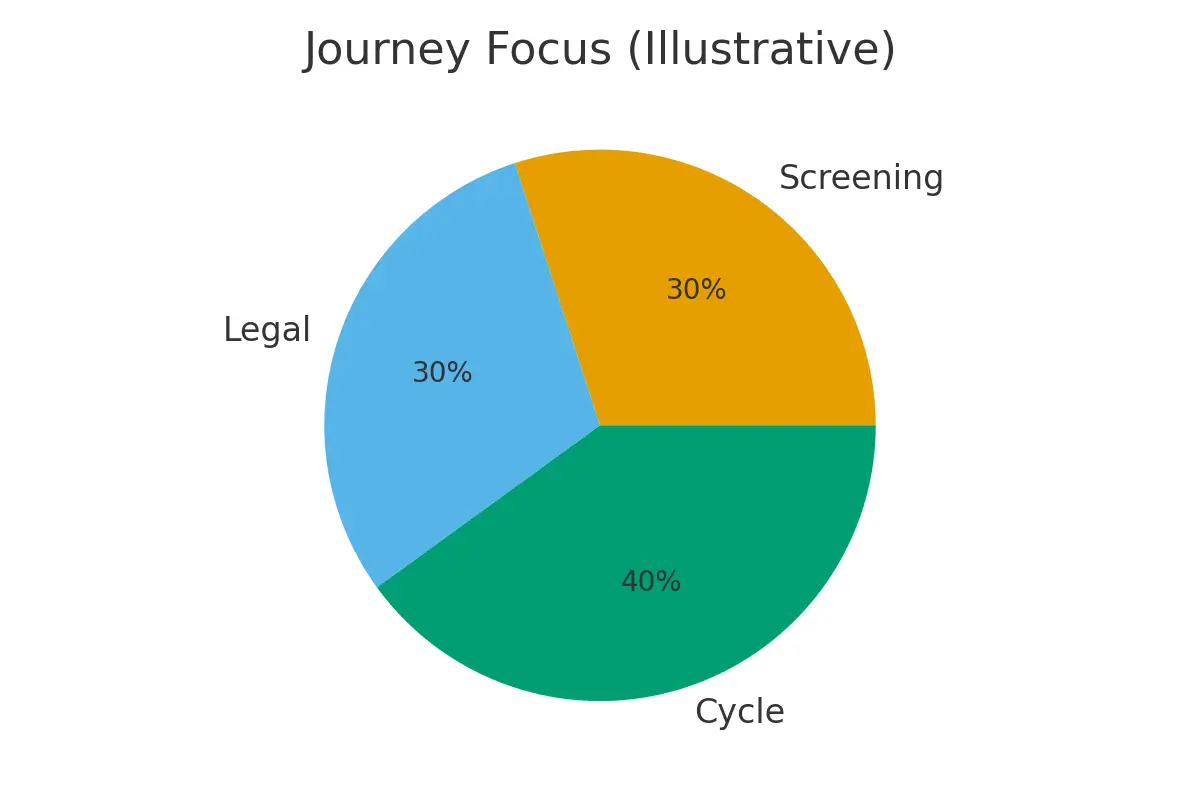
This article explains compensation & expenses — what’s typical within the Donor Options (Eggs vs Embryos vs Sperm) pathway. We focus on practical choices that influence outcomes, budgets, fairness, and timelines—so you can move forward with confidence.
What It Is
Compensation & Expenses — What’s Typical in plain English:
a clear explanation of what donors (egg, sperm, or embryo) are usually paid and what costs recipients are responsible for. These financial arrangements ensure ethical participation, reduce misunderstandings, and keep the process transparent for all parties.
Upstream clarity about compensation prevents downstream problems such as cycle delays, financial disputes, stress during treatment, and unexpected bills.
Who It Helps
This guidance supports:
- Individuals and couples using donor eggs, sperm, or embryos
- Patients balancing medical needs with budget constraints
- Intended parents who want transparency, fairness, and ethical compliance
- Anyone comparing donor paths based on cost, value, or success potential
- Families with complex histories—poor response, prior cycle failures, or genetic conditions
It also highlights when to consider alternative options based on age, labs, treatment response, financial comfort, and long-term family planning goals.
Step-by-Step
A simple sequence with timing checkpoints to protect embryo quality and reduce stress:
- Determine donor type — egg, sperm, or embryo.
- Review typical compensation ranges (varies by region and donor characteristics).
- Define reimbursable expenses — travel, lodging, lost wages, childcare, medications.
- Confirm agency or bank fees early in the process.
- Draft legal agreements that outline compensation and payment timing.
- Secure financial clearance with the clinic before cycle planning.
- Track payment milestones from match to retrieval/collection and confirm all receipts.
Each step ensures transparency and prevents last-minute financial surprises.
Pros & Cons
Pros
- Clear compensation promotes ethical donor participation
- Reduces misunderstandings between donor and intended parents
- Supports predictable budgeting and better planning
- Enhances donor recruitment, which expands options and improves matches
Cons
- Upfront costs can be significant (especially egg donation)
- Compensation structures vary widely between clinics, agencies, and regions
- Additional reimbursable expenses can accumulate unexpectedly
- Legal and financial coordination adds time to the process
Costs & Logistics
Typical line items include:
- Compensation to the donor (egg donors generally highest; sperm donors lower; embryo donors often minimal or altruistic)
- Agency or bank fees
- Medical screening costs
- Monitoring, retrieval/collection, and transfer fees
- Genetic testing
- Psychological evaluations
- Travel and lodging for the donor (if required)
- Lost wages, childcare, or partner support costs for known donors
- Legal contracts and independent counsel
- Embryology and lab fees (ICSI, freezing, storage, PGT-A)
Using a simple cash-flow map helps track what is paid upfront vs mid-cycle vs post-cycle, preventing budget stress.
What Improves Outcomes
Actions that truly help:
- Aligning compensation terms early to avoid cycle disruption
- Choosing donors who meet medical and genetic criteria regardless of cost differences
- Ensuring legal contracts clearly define payment schedules
- Confirming coverage, prior authorizations, and lab billing before treatment
- Setting expectations around travel and time commitments
Actions that rarely change outcomes:
- Choosing a donor solely because compensation is lower
- Adding non-essential reimbursements not required by contract
- Rushing into financial commitments before screening results
Case Study
A couple selected an egg donor with the right medical profile but underestimated travel and lost-wage reimbursements. Their lawyer added clarity to the contract, breaking payments into milestones. The clinic provided a cash-flow schedule to organize costs. With better planning, the couple avoided last-minute financial stress, stayed within budget, and completed the cycle on time with high-quality embryos.
Mistakes to Avoid
- Assuming compensation rates are the same everywhere
- Forgetting reimbursable expenses like travel or childcare
- Agreeing to terms before legal review
- Starting a cycle without financial clearance
- Not asking for a detailed cost breakdown from agencies and clinics
- Choosing a donor based solely on cost instead of medical suitability
FAQs
Q. Do egg donors receive the same compensation everywhere?
Ans. No. Compensation varies widely by region, donor experience, medical criteria, and agency policies.
Q. Are embryo donors usually compensated?
Ans. Most embryo donations are altruistic or involve minimal compensation, though legal and administrative costs still apply.
Q. What does “reimbursable expenses” usually include?
Ans. Travel, lodging, meals, childcare, lost wages, mileage, insurance needs, and other costs directly related to the cycle.
Q. When are payments typically made?
Ans. Payments are usually divided into stages: contract signing, screening completion, start of medications, retrieval/collection, and post-cycle expenses.
Q. Can compensation affect donor eligibility?
Ans. No. Medical and genetic suitability must always come first—compensation should never override clinical safety and ethics.
Next Steps
- Free 15-min nurse consult
- Upload your labs
- Get a personalized cost breakdown for your case
Related Links

Dr. Kulsoom Baloch
Dr. Kulsoom Baloch is a dedicated donor coordinator at Egg Donors, leveraging her extensive background in medicine and public health. She holds an MBBS from Ziauddin University, Pakistan, and an MPH from Hofstra University, New York. With three years of clinical experience at prominent hospitals in Karachi, Pakistan, Dr. Baloch has honed her skills in patient care and medical research.





